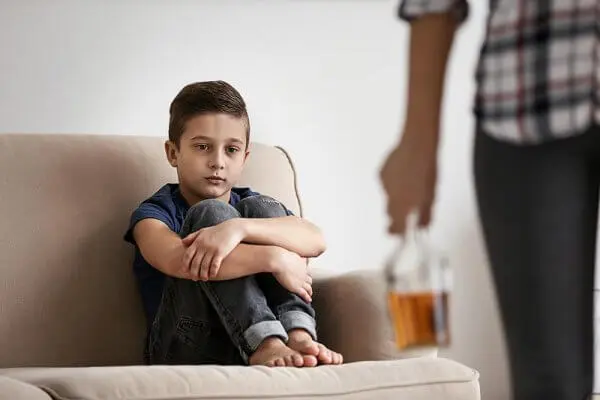7 Common Characteristics of Adult Children of Alcoholics

Data shows that more than 11% of children live with an adult who is addicted to a substance, nearly one in four U.S. children know an adult addict, and about 28 million children live with alcoholics. While levels of substance use, and their impact on family hierarchy and relationships vary considerably, Children of Alcoholics (CoA) suffer from arrested development, trauma, and often, abuse. This impacts growth and development considerably, resulting in distinct changes, personality subtypes, and common characteristics that many adult children of addicts share.
Children who are raised in families with an addicted parent are often faced with parental deficiencies such as less warmth and responsiveness, harsher interaction, and less physical or verbal engagement, maltreatment and abuse, less attachment patterns, and often consistent and repeated trauma. For example, children of addicts are more likely to be physically abused, to have to move suddenly, to experience frequent changes in lifestyle and parental relationships, and to find parents in uncomfortable situations or even blacked out. This trauma results in numerous changes, and many adult children of addicts suffer from the following common characteristics.
1. Trauma
Adult Children of Alcoholics (ACoA) are exposed to often frequent and repetitive trauma. Even in relatively normal households, alcoholic parents behave and react differently, may black or pass out, and may frequently abandon their child in favor of their substance. Studies show that this kind of trauma physically affects development, including of the brain – resulting in abnormalities or differences in the hippocampus, prefrontal cortex, and the cerebellum. These changes, which are developed during childhood stress or adversity, often do not go away, and continue to affect a child for the rest of their natural life.
Children who are exposed to traumatic events, such as physical, emotional, or sexual abuse, car accidents, instances such as losing a home and being homeless, and other trauma may also experience PTSD. Left untreated, this will continue to cause problems well into adulthood. In one study, more than half of children exposed to early childhood trauma were affected by mental disorders or substance use disorder later in life.
2. Antisocial Personality Traits
ACoS are more likely to suffer from antisocial personality traits such as avoidance, irritability, feels less guilt, is more readily able to lie or manipulate, and disregards right and wrong. While many ACoS suffer from an opposite problem, antisocial traits are often directly resulting from a lack of empathy or emotional warmth from parents, abuse, and trauma. Adults with these issues are more likely to show aggression to people and animals, engage in theft, destroy or vandalize property, and blatantly ignore or break rules for the sake of it.
Because antisocial behavior in ACoS is typically either a coping mechanism or the result of changes to the brain, it is often approached with behavioral therapy, psychotherapy, and teaching social skills.
3. Problems in Interpersonal Relationships
Because children of alcoholics are often raised with less emotional warmth and availability, sometimes blame themselves for their parent’s addiction, and are often emotionally or verbally abused, many develop maladaptive beliefs which inhibit their ability to form healthy or stable relationships with others. This can result in being emotionally withdrawn, not knowing how to connect, extreme reactions to small arguments, selfishness in relationships, and enabling or codependent behavior in relationships. Most need family therapy and therapy to move past these behavior patterns so that they can form and maintain normal healthy relationships.
4. Impaired Stress Management and Coping Mechanisms

Many children of adults develop maladaptive beliefs, which lead to internalized distrust, insecurity, emotional suppression, and constant anxiety. This often results in developing coping mechanisms, which can range from violence to drug use, or hiding. ACoS exhibit significantly higher instances of personal dysfunction, including anxiety, panic disorder, dysthymia, and social dysfunction in comparison with the general population, often strongly linked to instances of abuse, neglect, and mistreatment as a child.
This results in a strong tendency to use drugs or alcohol to cope, meaning that many ACoS benefit from Cognitive Behavioral Therapy (CBT), stress management techniques like mindfulness, and therapy.
5. Impulsive/Reckless Behavior or Extreme Resilience
Children of addicts are often put into high-stress situations early on, given more responsibility, and often forced to mature more quickly to deal with stress. For example, even very young children below the age of 10 may find themselves in a role where they care for themselves, siblings, and their parents in a way that is abnormal for someone of their age. At the same time, alcoholic parents are less often present, more emotionally withdrawn, and when capable of administering discipline typically do so in a way that is unhelpful. So, many grow into teen years and become rebellious, use drugs or alcohol themselves, vandalize, and otherwise flaunt or break rules.
This dichotomy of experiences typically results in one of two distinct personality types, either impulsive and reckless behavior or extreme resilience. In the first, adults are more likely to engage in crimes, gamble, spend money recklessly, speed, and otherwise behave recklessly. In the second, adults are more likely to be too careful, causing themselves unnecessary stress, but coping extremely well with hardship, pain, and problems.
6. Difficulty Managing Emotion
Combinations of stress, emotionally withdrawn parental figures, possible substance abuse as a teen, and trauma often result in adults who are emotional, but who don’t understand their emotions or how to control them. This can result in extreme reactions to small setbacks, anger, depression, anxiety, and other emotional difficulties. It primarily affects interpersonal relationships and self-management and discipline.
7. Prone to Addiction
While there are many factors linking ACoA to addiction, the two most clear-cut factors are genetics and Adverse Childhood Experiences (ACE) or trauma. The ACE scale, which was developed based on a study of over 17,000 people, directly links traumatic events, like addicted parents, losing family members, divorce in the family, etc., to an increased chance of addiction as an adult.
The second factor, genetics, is more difficult to track but equally as problematic. Children of addicts are genetically more prone to becoming addicts themselves, through a combination of genes which change the body’s reaction to substances and epigenetics, which are inherited from parents when those parents drink or use before birth. While we are still learning about both, studies show that genetics, or a parent abusing alcohol before conception, can increase the risk of developing an addiction by 40-60%.
Adult children of alcoholics suffer from numerous problems, many of which can be helped with therapy. If you or a loved one are a child of an addict, reach out for help. Cognitive behavioral therapy and family therapy can help you to learn and rebuild personal skills and coping mechanisms. If you are addicted to a substance, it is important to disclose a family history of substance abuse or alcoholism during intake.
If you or someone you love is struggling with alcohol abuse, contact us today and speak with one of our experienced and professional intake advisors, we’re here to help. Beginnings Treatment Centers is located in beautiful and sunny Southern California in Orange County, which has one of the most active and best recovery communities in the United States.

